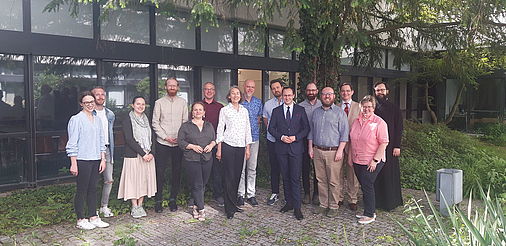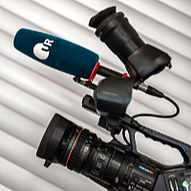Liturgy, Politics, and War
International Workshop: Uses and Abuses of Religion in Contemporary Politics
10 July 2023
A workshop on “Liturgy, Politics, and War in Contemporary Central, Eastern, and South-Eastern Europe” was organized by Dr. Paweł Figurski (Polish Academy of Sciences & Alexander von Humboldt-Fellow at the Chair of Liturgical Studies at the University of Regensburg) and Professor Dr. Harald Buchinger (Chair of Liturgical Studies at UR) at the Unviersity of Regensburg (UR) beginning of June. With six papers in three sessions, presented by scholars from different cultural backgrounds, the workshop sought to demystify the recent uses and abuses of religion in contemporary politics, especially in the former communist countries of Central, Eastern, and South-Eastern Europe, "where religion is key to understanding the local societies with their entangled history".
Religion as an Agent of Politics
Religion with its rites was not only a crucial agent of politics in premodern eras, as seminally elaborated by recent historiography, but remains to contribute to political affairs today. “The focus of our analysis was on liturgy in particular, for even today Christian worship serves as the dynamic force for shaping not only individual beliefs but also communal identities and public policies,” Dr. Figurski stated. This issue was especially evident in the recent Russian aggression on Ukraine, during which the Christian Orthodox religion has been manipulated to serve particular Russian imperialist agenda.
Liturgical Markers of Distinction
During the session 1, which was presided by Professor Dr. Harald Buchinger. The former “Beyond Canon_” Junior Fellow Professor Dr. Daniel Galadza, Pontificio Istituto Orientale (Rome, Italy), delivered his paper entitled "Liturgy and Identity on the Ecclesiastical Frontlines of Ukraine". In his contribution, Galadza pinpointed the upheavals in clerical vestments and gestures utilized in the Orthodox liturgies in Ukraine before and after the Russian aggression. The changes elaborated by Galadza illustrate the attempt to differentiate the various Churches active in Ukraine from the Moscow Patriarchate.
Professor Dr. Nadieszda Kizenko from the University at Albany, State University of New York, presented her paper "Lex orandi, lex credendi? Contemporary Liturgical Practices in Ukrainian Orthodox Churches and their Implications". In her contribution, Kizenko offered the description of various rituals practiced by the Ukrainian Orthodox Church and the Orthodox Church of Ukraine to show their different approaches toward such issues as hierarchy, canonical language, and traditional music, among others.
 International participants of the workshop "Liturgy, Politics, and War in Contemporary Central, Eastern, and South-Eastern Europe" at the University of Regensburg. Credit © Charlotte von Schelling/Beyond Canon_
International participants of the workshop "Liturgy, Politics, and War in Contemporary Central, Eastern, and South-Eastern Europe" at the University of Regensburg. Credit © Charlotte von Schelling/Beyond Canon_
Political Messianism and its Rites
In session 2, presided by Profesor Dr. Timothy Nunan (Transregional Cultures of Knowledge, DIMAS, UR), Dr. Sean Griffin from the Collegium for Advanced Studies, University of Helsinki, talked about "Putin’s Holy War of the Fatherland: Sacred Memory and the Russian Invasion of Ukraine". Griffin elaborated on the artistic program of the newly dedicated Main Cathedral of the Russian Armed Forces to show how the Soviet-age period in Russian history has been recently sacralized with iconographic, textual, and liturgical means.
Subsequently, in his paper entitled "Liturgical Origins of Polish Messianism", Dr. Paweł Figurski described the liturgical underpinnings and contemporary political significance of modern Polish mysticism in which the country’s history becomes the symbol of Christ’s salvific deeds. Figurski argued that the Polish messianism, embedded in various religious rites, was the force behind the expression of generous solidarity with refugees fleeing war after 24th of February 2022.
Discussing the Possibilities and Limitations of Religion in Peace-Building
During the session 3, presided by Professor Dr. Klaus Buchenau (Southeast and East European History, UR), Prof. Dr. Nina Glibetić from the University of Notre Dame (Indiana, USA) delivered the paper entitled "Church and Politics during the Collapse of Tito's Yugoslavia". In her contribution, Glibetić presented the contrived history of ecclesiastical engagement with the political events in the 1990s and more recent affairs in southern Europe, i. e., the Belgrade school shooting in early May 2023. Finally, Buchenau summarized the workshop discussions, pinpointing the possibilities and limitations of religion and its rites for contemporary peace-building processes.
Information/Contact
Dr. Paweł Figurski, Humboldt Research Fellow at the Chair of Liturgical Studies, Faculty of Catholic Theology, University of Regensburg
E-Mail: Pawel.Figurski@ur.de
Prof. Dr. Harald Buchinger, Faculty of Catholic Theology, Chair of Liturgical Studies
E-Mail: Harald.Buchinger@ur.de
For press enquiries:
Centre for Advanced Studies "Beyond Canon_" (FOR 2770)
Charlotte von Schelling
Charlotte.Von-Schelling@ur.de




